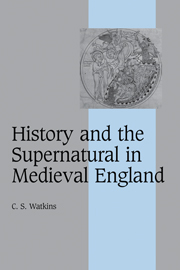Book contents
- Frontmatter
- Contents
- Preface
- Note on the text
- List of abbreviations
- INTRODUCTION
- Chapter 1 THINKING ABOUT THE SUPERNATURAL
- Chapter 2 INVENTING PAGANS
- Chapter 3 PRAYERS, SPELLS AND SAINTS
- Chapter 4 SPECIAL POWERS AND MAGICAL ARTS
- Chapter 5 IMAGINING THE DEAD
- Chapter 6 THINKING WITH THE SUPERNATURAL
- CONCLUSION
- Bibliography
- Index
- Cambridge Studies in Medieval Life and Thought Fourth Series
Chapter 1 - THINKING ABOUT THE SUPERNATURAL
Published online by Cambridge University Press: 23 June 2009
- Frontmatter
- Contents
- Preface
- Note on the text
- List of abbreviations
- INTRODUCTION
- Chapter 1 THINKING ABOUT THE SUPERNATURAL
- Chapter 2 INVENTING PAGANS
- Chapter 3 PRAYERS, SPELLS AND SAINTS
- Chapter 4 SPECIAL POWERS AND MAGICAL ARTS
- Chapter 5 IMAGINING THE DEAD
- Chapter 6 THINKING WITH THE SUPERNATURAL
- CONCLUSION
- Bibliography
- Index
- Cambridge Studies in Medieval Life and Thought Fourth Series
Summary
In thinking about the supernatural, the place to begin must be with the conceptual categories that the church offered as a means to make sense of the visible and invisible worlds: the miraculous and the demonic. These two categories had dominated the speculative thought of churchmen as they tried to make sense of the world in the early middle ages and they continued to shape the thought of churchmen at the beginning of the twelfth century. Augustine, still the most powerful influence, had indicated that God was seen to work in the world both directly through extraordinary miracles and indirectly through the ordinary course of nature. But he also insisted that ultimately this distinction was merely a matter of human convenience as all things, wondrous and non-wondrous alike, unfolded from the first and greatest of miracles which was creation itself. As absorbed by many monastic authors of the eleventh and twelfth centuries, such cosmological ideas encouraged ‘symbolist’ interpretations of history and nature. The world was conceived as a web of signs and symbols which illustrated or illuminated scripture rather than a mass of causes and effects to be elucidated through the exercise of reason. Wonderful things in the world should not be explained in human or physical terms because ‘the reasoning of men is surpassed by these wonderful works of God’. Scripture was the only secure guide and wisdom acquired through the senses proved a shallow and fragile thing.
- Type
- Chapter
- Information
- History and the Supernatural in Medieval England , pp. 23 - 67Publisher: Cambridge University PressPrint publication year: 2007

